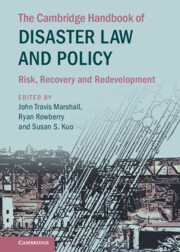Book contents
- The Cambridge Handbook of Disaster Law and Policy
- The Cambridge Handbook of Disaster Law and Policy
- Copyright page
- Dedication
- Contents
- Figures
- Maps
- Tables
- Contributors
- Foreword: Current Trends in Disaster Law and Policy
- Acknowledgments
- Introduction
- Part I Critical Perspectives on the Evolution of Disaster Law and Policy
- Part II Effective Governance as an Imperative for Responsive Disaster Law and Policy
- Part III Law’s Role in Promoting Hazard Mitigation: Intergovernmental, International, National, and Local Approaches
- Part IV Private Sector Initiatives to Promote Disaster Resilience and Recovery
- Part V Lawyers As Disaster Law and Policy Leaders: Training for Students and Guidance for Practitioners
- Part VI Cultural Heritage Protection and Cross-Disciplinary Opportunities for Advancing Disaster Law and Policy
- 26 Scheduled Monuments and Sites at Risk of Coastal Erosion: Danish Heritage Legislation and Actions
- 27 Heritage-Related Disaster Policy in the United States
- 28 Love for Heritage in the Time of Covid-19: Pandemics and Preparedness
- 29 Reflections on Urban Cultural Heritage, Public Health, and Public Participation
- Part VII Disasters and Vulnerable Communities
29 - Reflections on Urban Cultural Heritage, Public Health, and Public Participation
from Part VI - Cultural Heritage Protection and Cross-Disciplinary Opportunities for Advancing Disaster Law and Policy
Published online by Cambridge University Press: 27 October 2022
- The Cambridge Handbook of Disaster Law and Policy
- The Cambridge Handbook of Disaster Law and Policy
- Copyright page
- Dedication
- Contents
- Figures
- Maps
- Tables
- Contributors
- Foreword: Current Trends in Disaster Law and Policy
- Acknowledgments
- Introduction
- Part I Critical Perspectives on the Evolution of Disaster Law and Policy
- Part II Effective Governance as an Imperative for Responsive Disaster Law and Policy
- Part III Law’s Role in Promoting Hazard Mitigation: Intergovernmental, International, National, and Local Approaches
- Part IV Private Sector Initiatives to Promote Disaster Resilience and Recovery
- Part V Lawyers As Disaster Law and Policy Leaders: Training for Students and Guidance for Practitioners
- Part VI Cultural Heritage Protection and Cross-Disciplinary Opportunities for Advancing Disaster Law and Policy
- 26 Scheduled Monuments and Sites at Risk of Coastal Erosion: Danish Heritage Legislation and Actions
- 27 Heritage-Related Disaster Policy in the United States
- 28 Love for Heritage in the Time of Covid-19: Pandemics and Preparedness
- 29 Reflections on Urban Cultural Heritage, Public Health, and Public Participation
- Part VII Disasters and Vulnerable Communities
Summary
Cities did not somehow emerge fully formed; they developed gradually – usually in oscillating, uneven lurches of development over time. Exacerbated by climate change, extreme weather events and sea levels are rising rapidly. This poses a significant, immediate threat to coastal or riverine cities and the priceless historic resources that make them unique. As protecting cultural heritage becomes a global priority, identifying effective strategies that governments can use to identify, manage, and protect historic resources is critical. This chapter is divided into two sections. The first part discusses some of the public health benefits that historic resources bring to urban areas and how cultural heritage increases urban resilience. The second section analyzes two important technological strategies that governments at all levels should have (or develop) to fulfill their legal obligations to protect cultural heritage by engaging the public more broadly in preservation initiatives.
- Type
- Chapter
- Information
- The Cambridge Handbook of Disaster Law and PolicyRisk, Recovery, and Redevelopment, pp. 468 - 476Publisher: Cambridge University PressPrint publication year: 2022
- 1
- Cited by



